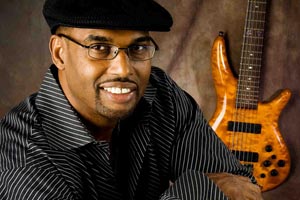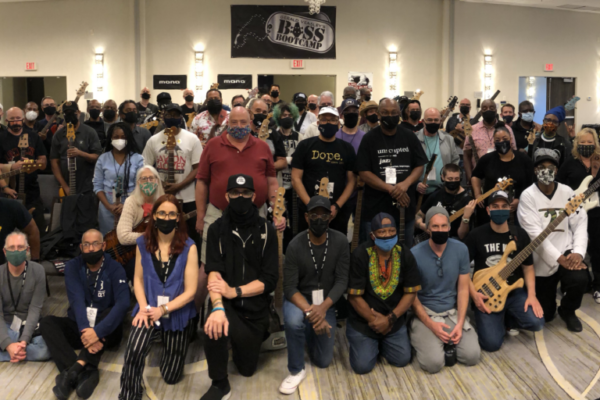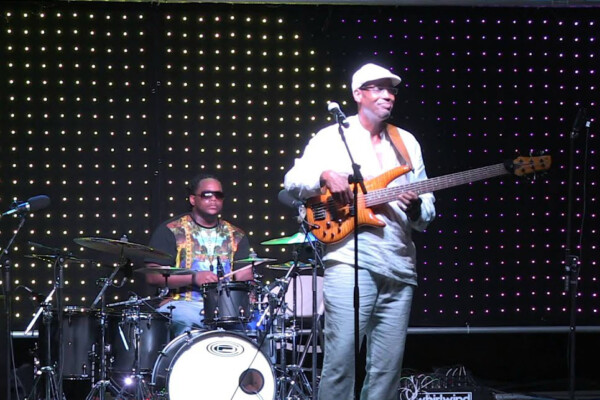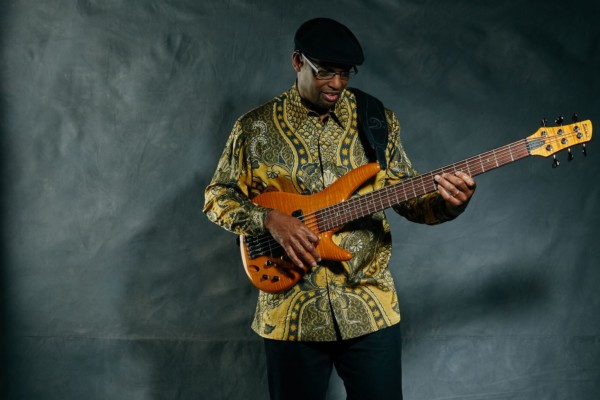An Interview with Gerald Veasley
 Attend just one of Gerald Veasley‘s Bass Bootcamps, and you’ll likely call yourself a Bootcamper for life. BBC, as the attendees call it, just celebrated its tenth anniversary this year, with Veasley maintaining a very active role. In addition to an impressive line-up of clinicians, bassists Victor Wooten and Stanley Clarke stopped by to check things out and share with the bassists in attendance.
Attend just one of Gerald Veasley‘s Bass Bootcamps, and you’ll likely call yourself a Bootcamper for life. BBC, as the attendees call it, just celebrated its tenth anniversary this year, with Veasley maintaining a very active role. In addition to an impressive line-up of clinicians, bassists Victor Wooten and Stanley Clarke stopped by to check things out and share with the bassists in attendance.
Gerald was drawn to education early in life, and his performance career has enjoyed plenty of success since. In fact, he holds the distinct honor of performing with Joe Zawinul for seven years — the longest run of any bassist with the late, great bandleader who was known for selecting bassists.
We sat down with Gerald during his most recent BBC event to find out more about it, his career, and his time with Zawinul.
Bass Bootcamp is 10! Tell us about your inspiration for starting it.
I’ve been a teacher forever. As soon as I figured out the first bass line that I ever learned, which was “Can’t Get No Satisfaction” when I was 12, I was looking for someone to show it to, to get them to play it. Since then, I’ve been blessed with being able to teach at places like University of the Arts. I’m on faculty there.
But back in the summer of 2001, I went to Europe and did a series of workshops in Austria for a good friend of mine who runs a music center there. It was my first time ever doing clinics over an extended period and seeing people develop right in front of my eyes. I didn’t know something like that was possible, because normally with private students it takes several weeks, and you see them once a week. It takes time to see that light bulb go off, or to see them making real measurable growth. So I had it in the back of my mind that I’d like to do something like that. I didn’t know what it would be; a week, three days, four days… Then interestingly enough that same summer, one of my students and his family went down to [Victor Wooten’s] Wooten Camp, and they came back raving about it. My wife and I were hearing the stories about what was going on and how people were impacted, and I said, “That’s what my event would look like.” Except instead of being nature related, it would primarily be for city-dwellers in a hotel or a school or something like that.
First I had the idea and a little bit of experience, and then Victor’s camp gave me the confirmation that something like that was possible. So I sat around the kitchen table with Lee Patterson and my wife Roxanne, and we designed this program.
Tell us some of your favorite moments from the last ten years
One of my favorite stories is the story of one of our campers, Linda, a New York native who woke up one morning and called her daughter and said, “You gotta take me to 48th street, to the music store.”
The daughter asked “Why?”
[Linda] “I wanna buy a bass.”
[Daughter] “Why are you buying a bass?”
[Linda] “I had a dream I was playing the bass.”
[Daughter] “But you don’t play the bass.”
[Linda] “Just take me. I wanna get a bass.”
So she bought this bass, she took some lessons, and she found out about Bass Bootcamp. She came and told me this incredible story about having a literal dream about playing the bass. Then the next year we saw her and she had another story and another waking dream. This dream was to use her bass playing in her work. So that’s interesting, and I asked her what sort of work she did. She is a grief counselor for people who were impacted by 9/11.
So that’s one of my most compelling stories because it points to the fact that it’s more than just the bass. The people that have come and taken this camp… it impacts their lives and then they use it to impact other lives, and that’s something that we really would not have imagined.
Part of that too is the incredible community you’ve created. Are you guys staying in touch throughout the year? How are you doing that?
Absolutely. We have a Yahoo group set up that is administered by one of our alumni. We decided a few years ago to have something where people could stay in touch because just those three days out of the year, it wasn’t enough. People hungered not just for the sense of community, but there were real friendships developing and there was opportunity for people to be tied together and encouraging each other and hold each other accountable and check on everyone and see how everyone is doing. We call it the BBC family. To me it’s even a step beyond community because folks really care about each other’s development. So we use the Yahoo group as a way for folks to stay in touch and comment on everything from pickups and amps to “how are your kids doing?”
You guys play a big role in that support, but do you think this behavior is inherent is in bass players compared to other musicians to begin with?
I’ve thought about that a lot, and I’ve heard other people comment about that. First of all, there’s something about people who are drawn to playing the bass. That they don’t mind being in a supportive role, so it’s no surprise they would support each other. They do it with other musicians, and they do it with each other in their personal lives, so it’s only fitting.
So, what is it with Philly and bass players? Are you guys putting something in the water?
You know this is a question that I don’t don’t how many times I’ve been asked this question, and I still don’t have an adequate answer for it.
I’m wondering if the fact that so many notable bassists come from this area that younger players (or just audience members) were inspired to play or just got a front row view of how it is done.
For me, and maybe this is true of some other bass players, I as a young aspiring musician, I didn’t know how professional musicians became professionals because I just enjoyed playing music. So we had bands all throughout the city of Philadelphia during that time in the ’70s. In the late ’60s, every neighborhood had a band, so you were just in a band or in a gang. So it was really a natural part of life.
I never thought about, “how do people become professional? How do people step out of the shadows?” Particularly on the bass. But then I saw Stanley Clarke, and I said, “Wow, OK. Here’s somebody that has made his way as a professional musician as a bass player, not just someone playing on the road in a singing group, but someone who is an artist on the front making great music, composing, as really an artist (and an icon now).”
And I think those things kind of affirm that it’s possible. When they happen to be from your hometown, it makes you work harder to say, “well maybe I can do this, too.”
So you were conscious of that early on, that he was from this area?
Yea. Well, I wouldn’t say early on, but certainly when I found out about it and the great lineage of bass players I was proud to be a part of it.
What made you choose bass?
For me, I always wanted an instrument, since the time I could talk. When I really was clear on the instrument I wanted, it was the bass. I loved guitar, I loved the whole guitar aesthetic, I love acoustic guitar playing, and I love everything about the sound of stringed instruments. I love that sound. But when I was looking at all the instruments I could probably take, the bass seemed like the one that was most accessible. It kind of spoke to me.
One thing I’ve found out about the bass is that if you have a little bit of talent, you can make music on it right away. You can play something that sounds like music, which isn’t true of every instrument. It certainly isn’t true of the violin, or the clarinet, or even the saxophone! But that’s not to say that no effort goes into making music on the bass, but there’s something very accessible about it and that’s why I love teaching people who never have played before.
One of the things I’ve found is that when you’re first starting to play an instrument and you’ve never done it before, you go from having no knowledge to all of the sudden being able to play a song. That’s one of the biggest accomplishments you can have in your life, because you’ve gone from nothing to something. You’ve produced something that didn’t exist before. If you’re a kid, you can run in and tell your mom “look I can play this song.” You have so many of those moments. Sometimes when you’re working with advanced players, those moments are hard to come by because they’ve done so much and learned so much. So to me, one of the reasons the camp is so thrilling, is we get all levels. I get to constantly experience that moment of showing something to somebody that now they can do that they couldn’t do a moment before.
Joe Zawinul had a knack for picking bass players. It’s a who’s who list and you’re in that fraternity. Can you share something about your experience with Zawinul?
I don’t know where to start… I guess I’ll start at the end and tell you the reason I left Joe Zawinul’s band was probably unlike many of the other reasons people left the band. Joe had this reputation for being hard and rough, and a task master. And he was in a sense, but he was never mean-spirited. He always said to me and the other players, “look, if I have a criticism it’s nothing personal. It’s only about the music.” He loved to laugh, he loved good food, he loved to drink his Slivovitz, he loved a great joke, he loved boxing… So he really enjoyed life. But to him, being on the bandstand was a very special thing and being in the music world he took it very very seriously.
The reason I eventually left the band was I felt I wasn’t growing. I had been with him seven and a half years. That’s a long time, and I’m probably one of the longest tenured musicians to work with him, but I got a little restless after a while. With Joe, you could never ask him, “what’s that voicing?” or “how do you arrange this?” or “what are you doing with your left hand?” You could never ask him nuts-and-bolts type music questions because he would say “oh, that’s nothing… I just do it you know. It doesn’t mean anything.” He was a very schooled musician, but for him, those kind of things were boring. For him it was more about leading a creative life that encompasses all those other things I just mentioned. So the nuts and bolts of drilling down into the music academia, that was stuff he had done fifty years before.
For me, still being hungry to learn everything I could, I got a little bit restless and ready for the next thing where I could learn and grow. So we parted, on excellent company. I’m proud of that to this day because I told him months before I was going to leave the band. I said “hey, on this tour coming up, I’m not gonna go on it.” And he said, “It’s good, I understand. It’s time you do your thing. It’s time for you to make it. Who knows, maybe we will work together in the future.” I learned so much from that because we had this mutual love and respect.
But after I left, it was really one of the saddest periods of my life, because then I realized that I had been learning all along. I had been in school all along! And that’s why one of the Bass Boot Camp commandments is that the student has to take 100% responsibility for the instruction. Because if you want to learn, you have to be open because there are opportunities to learn every moment.
Your Electric Mingus Project has been going on for a while, and now there’s the CD. Tell us about that project.
Yea, we started the project in 2001 with a series of concerts. I had loved Mingus’s music for a long time, and it gave me the opportunity to study his music more and join forces with some great musicians who I happen to be teaching with at the University of the Arts. Chris Farr, the saxophonist also plays the EWI, which is an important part of the timbre and the sonic tapestry of the record. John Swana, flugelhorn trumpeter, who is a great improvisor, actually used to play with the Mingus Big Band and has led his own bands, and he also plays EVI. I thought it would be nice instead of having piano or guitar, that there would be something special about having vibes, in terms of having a little bit more space for my instrument.
You know making a lot of records with Richard Waller producing and engineering, one of the things we’re always kind of struggling with is making a record that’s not necessarily a bass record, where you have everybody else real soft an yourself really loud and you’re taking all the solos and playing all the melodies. So we’ve been working on that all those years. But with this group, there’s sonically so much more space, so harmonically, things are covered, and using vibraphone leaves more room in terms of the way the harmonics work, as well as his approach to playing. His name is Tony Micelli.
Harry Butch Reed is a drummer that I’ve known since we were teenagers. He’s a great all around drummer but a beautiful jazz drummer. Then we used a few percussionists as guest artists: Leonard “Doc” Gibbs, who also worked with Grover [Washington, Jr.] back in the day, and Pablo Batista who worked with Grover a few years later. Both have recorded with me on other projects, too. The first record we did as sort of a fundraiser for ALS, which is what Mingus suffered from and eventually what he passed from. But Richard Waller, my producer, came up with the idea of taking some of those tracks that were done really quickly and adding some new instrumentation to them, working the mixes, and taking our time to write new pieces and arrangements, and that’s the record that came out now.
Why 10 years for a record?
In my case, I was making contemporary jazz records signed to Heads Up Records for 17 years, which was a great opportunity because it enabled me to record eight CDs for them. So it kind of gave me the chance to build my career as a solo artist, as a band leader, but I worked in a much narrower framework. It was somewhat limiting. I’m very grateful for the experience, but there are some things that they do very very well. Like they do smooth jazz and contemporary jazz really well, and then when you try to do something else it’s a little tougher. You know, I’ve played in avant garde, gospel, straight-ahead jazz, contemporary jazz and smooth jazz… So this record finally gave me the chance to do a recording where I’m breaking out of the box and doing something where maybe people don’t associate with my name after my recording career for 17 years. The great thing is to do it on my own label, we can really do it anyway we want.
And it’s called Fanwave Media?
Right. Last year Richard Waller and I started this label as an outgrowth of our experience of making music together for a long time. So we learned a lot business-wise and now that the whole landscape and delivery of music has changed and the way that music is marketed and sold, this was perfect timing for everything.
This has been an interesting year: Victor Wooten started his label, you started yours, Stanley Clarke has his. What is driving all of this?
A lot of “old school” versus “new school” is still being sorted out, because we can’t throw everything out that’s old school. You know, certain segments of the listening public for example still wants a physical product. Certain people have already migrated to listening to music on their computers and their iPods, but not everyone. LPs are back in a big way. So this label serves a few purposes. First and foremost it is a way for me to get creative projects out, for Richard to get his creative projects out, but it’s also a vehicle for other artists. That’s what we really wanted to do. Something where other artists could reach their fans. We really believe in the 1,000 true fan theory. We think it’s really tough if you’re a developing artist to do everything yourself, so we’re hoping to build an environment where the artist doesn’t have to do it in a DIY world where they don’t have to do it all themselves.
What did I miss?
I’ve never faked the funk on a nasty dunk.
I can’t believe I missed that one!



